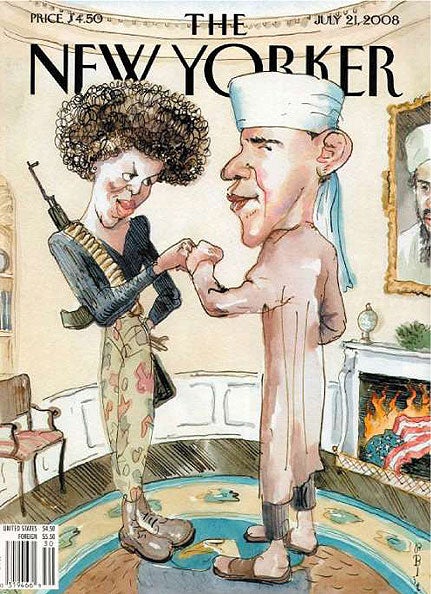Obama fails to see funny side of cartoon satirising American fears

Famed for 15,000-word, in-depth articles, cartoons and merciless fact-checkers, The New Yorker magazine seems to have winkled out an essential truth about Barack Obama – he doesn't do satire.
The Democratic contender's crankier side was on full display yesterday as his campaign launched an offensive against – of all things – the cartoon cover of the latest edition. It shows the presidential candidate dressed in a turban, fist- bumping his wife, Michelle, in an afro, with an AK47 over her shoulder. An American flag goes up in flames in their fireplace, while a portrait of Osama bin Laden hangs above the mantelpiece.
Hilarious to the sophisticated readers of The New Yorker, it was infuriating for Mr Obama, whose campaign is waging a daily battle against a viral internet campaign of rumours, lies and innuendo against him – a problem neatly summed up by the cartoon. Only last week, a poll by the respected Pew organisation revealed that 12 per cent of Americans still think Mr Obama is a Muslim (strangely, one per cent think he's Jewish, which could be just as damaging in some parts of America).
The Obama campaign spent yesterday denouncing the cartoon as "tasteless and offensive" and was deaf to the protests of The New Yorker's editor, David Remnick, who tried to explain that "the target of this are the lies spread about Obama which are such nonsense that you'd think this would be obvious to anyone". The cover holds "up a mirror to the prejudice and dark imaginings" of Mr Obama's past, he added.
The New Yorker even issued a press release explaining how "artist Barry Blitt satirises the use of scare tactics and misinformation in the presidential election to derail Barack Obama's campaign".
All to no avail. When Mr Obama was asked by a reporter on a campaign stop in San Diego: "Have you seen it? If not, I can show it to you on my computer. I wondered if you've seen it or if you want to see it or if you have a response to it?", there came a shrug of incredulity. "I have no response to that," said the man who may soon have weightier issues to tackle should he win the White House in November.
Later his spokesman, Bill Burton, issued a statement saying: "The New Yorker may think, as one of their staff explained to us, that their cover is a satirical lampoon of the caricature Senator Obama's right-wing critics have tried to create. But most readers will see it as tasteless and offensive. And we agree."
Pity then the patient New Yorker journalist Ryan Lizza who spent weeks uncovering details of Mr Obama's early political life in Chicago, only to find his work eclipsed by the fuss over the cartoon. The article went to print over the objections of the Obama campaign, but the exaggerated anger was focused on the cover not the content.
Lizza rattled the Obama campaign by challenging the notion that the champion of the Democratic Party is some kind of anti-establishment revolutionary who will clean out Washington's Augean stables if he wins the White House. "Rather, every stage of his political career has been marked by an eagerness to accommodate himself to existing institutions rather than tear them down or replace them," Lizza writes.
He describes how, as a community organiser, Mr Obama worked within the power base of Chicago's churches. Although he started out agnostic, he was a practising Christian by the time he first sought office. "At Harvard, he won the presidency of the Law Review by appealing to the conservatives on the selection panel," and in Illinois, "rather than challenge the Old Guard Democratic leaders, Obama built a mutually beneficial relationship with them," playing poker with the lobbyists he now excoriates as well as Republican politicos.
Even in Washington, Mr Obama's Senate career has been marked by caution. As soon as he arrived on Capitol Hill he went out of his way to not define himself as an opponent of the Iraq war, although opposing the war was the launch pad that sent him into the political stratosphere from distant Illinois.
Yesterday, the Obama campaign focused on dousing the flames. But even some of its cheerleaders were mystified at the reaction. "The notion that most Americans are incapable of seeing that [it is satire] strikes me as excessively paranoid," said Andrew Sullivan, of the political magazine The Atlantic.
Subscribe to Independent Premium to bookmark this article
Want to bookmark your favourite articles and stories to read or reference later? Start your Independent Premium subscription today.

Join our commenting forum
Join thought-provoking conversations, follow other Independent readers and see their replies